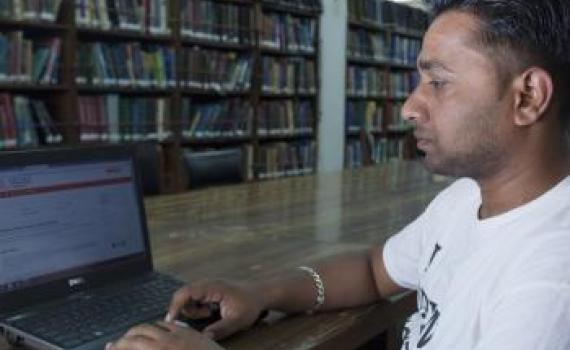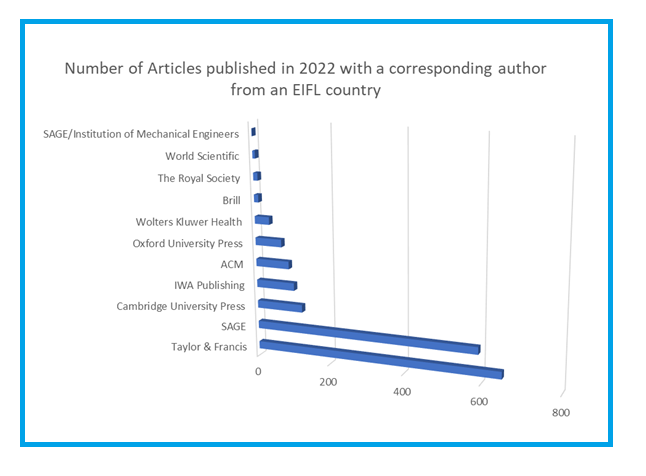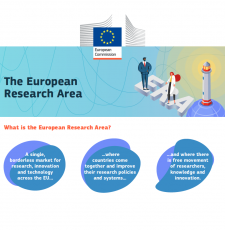
Lorraine Estelle, EIFL Licensing Programme Manager, discusses the impact of EIFL’s open access publishing agreements on publishing by authors in our partner countries.
As more and more research articles are published in open access each year, it is increasingly clear that participation in journals that charge Article Processing Charges (APCs) is tilted toward researchers with the greatest resources. Authors that have funding to pay APCs can participate and receive the benefits of being published in open access in those journals. APCs are beyond the reach of authors without such funding in EIFL partner countries and the reason we continue to help level the playing field by negotiating open access agreements with publishers.
The trend seems to be that the cost of APCs is increasing rapidly, and so it is more important than ever that we negotiate with publishers so that researchers in EIFL partner countries can choose to submit their articles to the publication venue suitable for their research.
We now have open access agreements with 14 publishers which cover journals across an array of disciplines. This means a total of 2,280 journals in which authors from EIFL partner countries can publish without charge, or with a heavily discounted APC.
In 2022, we signed a new agreement with the Association for Computing Machinery (ACM) providing a free read & publish agreement for 70 hybrid and open access journals and conference proceedings for authors from 25 EIFL partner countries. This agreement provides high quality and free publication venues for authors working in the area of computer science. ACM reports that in this first year of this agreement 91 articles were published in ACM publications from authors from 12 EIFL partner countries.
The other new agreement announced in May 2022, was with Oxford University Press (OUP), which provides free publishing for authors from 29 EIFL partner countries in 98 fully open access journals across a range of discipline areas including science, mathematics, medicine, social science, and law. Although only in place from May, the publisher reports that it published articles by 72 authors from EIFL partner countries.
In total the publishers reported that 1,679 articles were published in open access from authors in EIFL partner countries in 2022, an increase of 600 articles compared to 2021. Of these, 1,471 (87%) articles were published with a full APC waiver.
As the table (below right) shows, the publishers with the greatest number of journal titles, Taylor & Francis and SAGE, account for the greatest output from authors from EIFL partner countries. However, IWA Publishing, which publishes 15 open access journals in the area of water and related environmental fields, is another important publishing venue. 108 articles by authors from 17 EIFL partner countries were published in those journals in 2022.
Data Collection and verification
 The transition to open access requires standards and good practices in open access reporting. As library consortia that negotiate transformative agreements worldwide have reported, gathering and checking the data on articles published is time-consuming and reveals discrepancies.
The transition to open access requires standards and good practices in open access reporting. As library consortia that negotiate transformative agreements worldwide have reported, gathering and checking the data on articles published is time-consuming and reveals discrepancies.
The figures used in this blog come from the reports EIFL receives from the publishers with which we have agreements. We check these reports, to verify the articles were actually authored by corresponding authors eligible according to our agreements and we remove erroneously reported articles, for example when a corresponding author is not from an eligible EIFL partner country.
We also check the reports against the Web of Science (WoS) database for accuracy, although not all the journal titles are indexed in this database. This year we found 52% of the articles in the publisher reports were indexed in this database. This is because none of the 91 articles published by ACM (many of which are conference proceedings) are indexed. Other articles in the publisher reports do not appear in WoS reports because the journal titles are not indexed, these journals are usually gold open access titles, which in some cases, do not have a long publishing record. Although, some of the journals which are not indexed in WoS, are included in other Clarivate products such as the Journal Citation Reports or the Web of Science Emerging Sources Citation Index (ESCI). Interestingly we also found 295 articles in WoS, by eligible corresponding authors, that were not included in the publishers’ reports.
Our membership in the OA Switchboard is one of the ways that we are supporting the development of reporting standards in this area. This initiative is designed to simplify the sharing of information about open access publications. We hope that more publishers will join the OA Switchboard. Currently only four of the publishers with whom we have agreements have joined, and we encourage the others to do so.
Opportunities for all authors in EIFL partner countries
A level playing field would mean that all authors can publish in open access, whatever the type of journal, both fully open access (gold) and hybrid journals. In 2022, the EIFL publishing partners reported that 89% articles by EIFL authors were published in gold open access journals and 11% in hybrid journals.
Some publishers argue that waivers and discounts are not required for hybrid journals, because authors can publish in them without paying. But this means that authors cannot participate in open access, making their research immediately available to everyone and that they cannot benefit from increased dissemination and citation.
For example, data from The Royal Society of Publishing showed that open access articles in its journals received on average 48% more downloads and 14% higher Altmetric scores [measuring the volume and attention] than subscription articles. This is why we aim to negotiate agreements that cover both types of journals. We also aim to ensure that researchers or their institutions in EIFL partner countries do not have to pay APCs. In general even discounted APCs remain unaffordable, and we are concerned about this. It is the reason we aim to negotiate for full waivers whenever possible.
We are open to talk to more publishers. Please get in touch - lorraine@eifl.net
SHARE / PRINT







